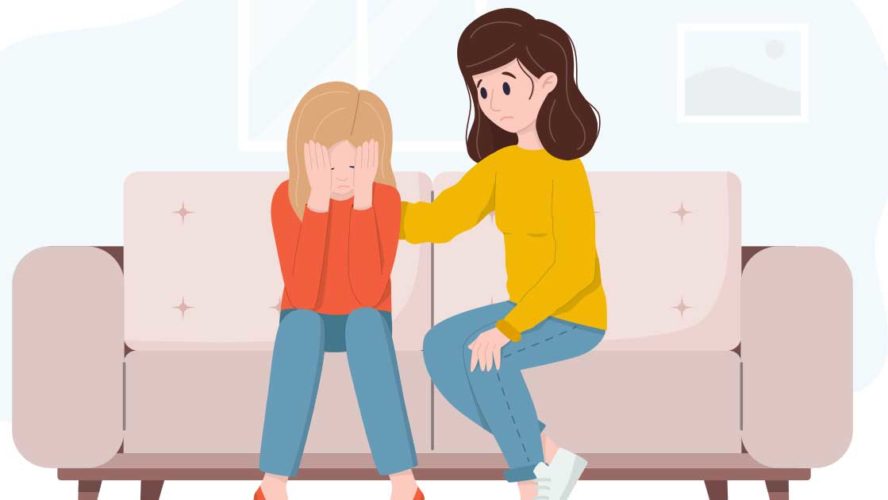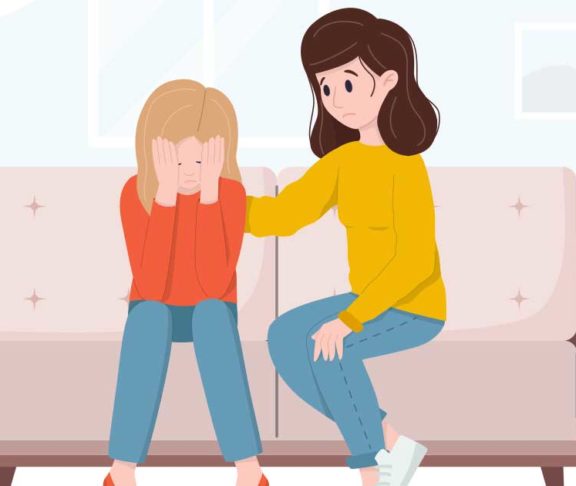Mental Health First Aid (MHFA) is an evidence-based training program administered by the National Council for Mental Wellbeing that teaches individuals how to identify, understand, and respond to signs of mental health and substance use challenges. We talked to MHFA vice president Tramaine EL-Amin about some strategies for approaching mental health conversations with both teens and seniors.

Tramaine EL-Amin
Vice President, Mental Health First Aid (MHFA)
“While it can be difficult for adults to accept that the teens in their lives may be experiencing a mental health challenge or crisis, getting educated on the signs and symptoms may help save a life.”
What are some signs that a teenager may be experiencing a mental health challenge?
A mental health challenge is defined by Mental Health First Aid as a major change in a youth’s thinking, feeling, or action that interferes with their ability to live their life; the interference lasts longer than typical emotions or reactions would be expected to.
Teens may not always know how to talk about what they are experiencing or ask an adult for help. That’s why it’s important for adults who interact with young people frequently, such as parents, teachers, or coaches, to recognize the signs that a teen may be experiencing a mental health challenge, and how to connect them to appropriate support.
Potential warning signs that a teenager may be asking for help with a mental health challenge include:
- Withdrawing from friends, family, and social activities
- Frequently arguing with adults and/or purposely breaking rules; displaying aggressive behavior
- Losing interest in favorite activities and not replacing with other pursuits
- Difficulty remaining focused and maintaining concentration across a variety of tasks and settings
What are some tips for starting a conversation with a teenager about the importance of mental health?
In a non-crisis situation, here are some tips for starting a conversation with a teenager about the importance of mental health:
- Plan to talk privately about your concerns at a mutually convenient time in a place free of distractions. If the teen appears preoccupied or busy, you may want to wait until they are less distracted.
- Let the young person know you are ready when they are — do not put pressure on them to talk right away.
- Allow the youth to express their thoughts uninterrupted. When appropriate, ask questions, but do not push.
- Set aside your own beliefs and reactions to focus on the needs of the youth to be heard, understood, and helped.
- Ensure you do not express any negative judgements and respect the youth and their experience.
If someone knows a teen who’s going through a mental health crisis, what sorts of resources should they help them access?
While it can be difficult for adults to accept that the teens in their lives may be experiencing a mental health challenge or crisis, getting educated on the signs and symptoms may help save a life.
Here are some tips from the Youth Mental Health First Aid curriculum on how you can provide initial support for a teen experiencing a mental health crisis:
- Ask the young person directly if they are having thoughts of suicide or thinking about killing themselves. Appearing confident in the face of crisis can be reassuring for the young person in crisis. It’s important to ask the question without expressing any negative judgement toward the teen.
- Always seek professional help when a young person is experiencing suicidal thoughts. This may mean calling or texting the Suicide and Crisis Lifeline at 988, or taking them to the emergency department of a hospital, a community mental health center, or a doctor’s office.
- Clearly state that thoughts of suicide are common, and that help is available to discuss these thoughts. According to the National Alliance on Mental Illness, nearly 20% of high school students report serious thoughts of suicide.
- Express empathy for the teen and acknowledge what they are going through. Give them the opportunity to talk about their feelings and the specific problems they are facing.
- Do not leave a young person who is experiencing a crisis alone. People rarely act on suicidal thoughts with other people present.
If you are worried that your teen is experiencing a mental health crisis, you can offer other support systems and resources where they can have confidential conversations with trained staff and volunteers. You can also reach out to these resources for support on how to help your teen.
- Call or text the Suicide and Crisis Lifeline at 988 or use the chat function at 988lifeline.org to talk with a trained counselor at any time.
- The Trevor Project supports LGBTQ youth. Text START to 678-678, or call 866-488-7386 or chat with them directly from their site.
What is the Mental Health First Aid Action Plan, and how can it be used to help navigate a mental health or substance use challenge?
A person who has completed an Adult or Youth Mental Health First Aid training learns a 5-Step Action Plan (ALGEE) to recognize warning signs of a mental health or substance use challenge, provide help in both crisis and non-crisis situations, and understand where to turn for additional assistance. In the training, First Aiders practice using the Action Plan in various hypothetical scenarios and receive guidance from certified Instructors to ensure they feel confident taking action.
The MHFA Action Plan has five steps, which can be used in any order:
- A – Approach, assess for risk of suicide or harm: When helping a person going through a mental health crisis, it is important to look for signs of suicidal thoughts and behaviors, non-suicidal self-injury, or other harm.
- L – Listen nonjudgmentally: Mental Health First Aid teaches you to use a set of verbal and nonverbal skills, such as open body posture, comfortable eye contact, and other strategies to engage in appropriate conversation.
- G – Give reassurance and information: When talking to someone you believe may be experiencing symptoms of a mental health challenge, approach the conversation with respect and dignity and don’t blame the individual for their symptoms.
- E – Encourage appropriate professional help: The Mental Health First Aid course provides a variety of local and national resources to connect individuals in need of care.
- E – Encourage self-help and other support strategies: Individuals with mental health challenges can contribute to their own recovery and wellness through exercise, meditation, peer support groups, self-help books, and engaging with their social networks.
Regardless of the nature of the situation, staying calm is crucial as you offer help when in the role of a First Aider. First Aiders do not diagnose anyone or attempt to solve the problem, but instead provide initial support and information to someone who may be experiencing a mental health or substance use challenge.
Why is senior mental health often left out of the larger mental health conversation?
Mental well-being is as important in older age as at any other time of life, but an estimated two-thirds of seniors with mental health challenges do not get the treatment they need. This has serious implications for older adults and their loved ones, since at least 1 in 4 older adults experiences a mental health challenge.
According to the World Health Organization, mental health challenges are under-identified by healthcare professionals and older adults themselves. Symptoms of depression can be overlooked as just a “normal” part of growing older as seniors face declining physical function, reduced independence, social isolation, and bereavement over lost loved ones. The misconception that depression is a consequence and byproduct of getting older leads to underdiagnosis and undertreatment among seniors.
Further, older adults are less likely to seek care from a mental health professional than their younger counterparts. Due to stigma and misinformation about mental health concerns, seniors may be reluctant to seek help for fear of judgment. They may not bring up emotional symptoms, and instead opt to describe physical ones, such as a lack of energy, reduced quality of sleep, and loss of appetite.
Are there tools and resources available to help an older loved one address their mental health?
Mental Health First Aid for Older Adults is an early-intervention course developed for adults who work with, live with, or care for older adults to learn how to assist and support those who may be experiencing a mental health or substance use challenge. The course covers topics including:
- The unique impact of mental health and substance use challenges on older adults
- Risk factors and protective factors specific to older adults. A risk factor is something that helps to create problems. A protective factor is something that helps to prevent problems.
- Applying the Mental Health First Aid Action Plan in scenarios designed to reflect the unique needs and experiences of older adults
- National, regional, and community mental health resources for older adults and their caregivers
Additional tools and resources for older adults listed by the National Institute of Mental Health include:
- Depression is Not a Normal Part of Growing Older: The Centers for Disease Control and Prevention webpage describes signs of depression and how depression can be different for older adults.
- Healthy Aging: This U.S. Department of Health and Human Services webpage lists links to health resources and services for older adults.
- Health Information Related to Aging: The National Institute on Aging offers health information on a variety of topics, including depression.
- Information About Older Adults: The Substance Abuse and Mental Health Services Administration offers publications for and about older adults.



